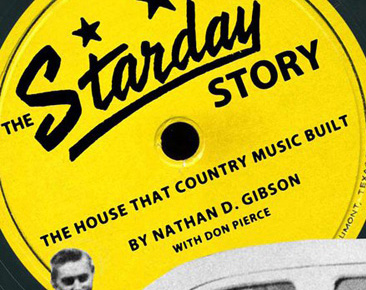
 Just as the rock ‘n’ roll era dawned and country music and its off-spring bluegrass music was being overwhelmed by the popularity of this new musical style, a savior appeared in the form of Don Pierce and his recent acquisition, Starday Records.
Just as the rock ‘n’ roll era dawned and country music and its off-spring bluegrass music was being overwhelmed by the popularity of this new musical style, a savior appeared in the form of Don Pierce and his recent acquisition, Starday Records.
Starday Records was actually started in Texas by Jack Starnes and Harold W ‘Pappy’ Dailey, but it was the later leadership of Pierce that was the making of the label.
Written by Nathan D. Gibson, essentially with the help of Pierce, The Starday Story—The House That Country Music Built retraces the label’s origins in 1953 through to 1968 when the Starday-King merger took place.
While country music, and its first ‘star’ act George Jones, was the label’s first claim to notoriety, Starday built an extensive bluegrass roster, which included the Stanley Brothers, Jim & Jesse, Bill Clifton, Carl Story, the Lewis Family, the Lonesome Pine Fiddlers, Jim Eanes and the early Country Gentlemen, some of whom came to the label through Mercury-Starday deals.
The Stanley Brothers were the first bluegrass music act to have a single release – The Flood b/w I’m Lost, I’ll Never Find a Way (71064) – with the Mercury-Starday imprint, but it was Bill Clifton’s recordings of Gathering Flowers From The Hillside b/w Take Back The Heart (You Once Gave) (290) that was the earliest bluegrass release for Starday per se (1957).
As already illustrated, the book’s 70 page listing of every single and every LP released over the years by Starday and its subsidiary labels is a great resource for researchers.
Helpfully, Gibson’s linear history also includes the release number, in parenthesis, after each title mentioned in the text.
The story makes reference to the many ups and downs for Starday Records, but the wealth of detail doesn’t overwhelm the reader. One interesting aspect of the book is the reference to sales figures; for example, citing the sale of 25,000 as being the break-even point for Stanley Brothers single releases in the Mercury-Starday era. According to ‘Dee’ Kilpatrick, a some-time A & R man at Mercury Records, he “even made a little money.”
Don Pierce was an avid fan of bluegrass music and he invested much in artists who had been recently released by major labels. To use a euphemism, ‘he put his money where his mouth is,’ and the bluegrass music world is grateful for that, as bands produced some of their best work despite some less than state-of-the-art studio equipment.
Whenever there was a low point in Starday’s history, Pierce seems to come up with a solution; to wit releasing multi-artist and thematic compilation LPs, packagings that Gibson claims on behalf of Starday to be a trend-setter, despite later being the bane of collectors’ lives also. Starday’s fortunes are due to the ingenuity of one man, Don Pierce.
A graduate student of folklore and ethnomusicologist and a performing musician, Gibson’s love of his subject is evident. He immersed himself to such an extent that he looked not only at the history of this very important independent label, he provided insights into artist and song selection, the recording process, and distribution/marketing during a very difficult time for bluegrass and country music
The many wonderful anecdotes from artists, musicians and Starday staff, among others, make The Starday Story an extremely informative and enjoyable book to read.
Detail:
- Publisher – University Press of Mississippi
- 266 pages, hardback
- ISBN-10: 1604738308
- ISBN-13: 978-1604738308







